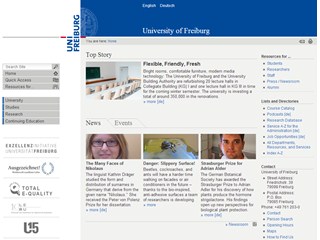University of Freiburg

University of Freiburg, officially the Albert Ludwig University of Freiburg (German: Albert-Ludwigs-Universität Freiburg), is a public research university located in Freiburg im Breisgau, Baden-Württemberg, Germany.
The University of Freiburg was founded in 1457 by Archduke Albert VI of Austria. It was the fifth university to be established in Germany, and it quickly became one of the most prestigious universities in Europe.
The university initially offered programs in theology, law, medicine, and philosophy. Over time, it expanded to include programs in all major disciplines. The university also became a center for the humanist movement during the Renaissance.
In the 17th century, Freiburg was temporarily under French rule. During this time, the university underwent a number of reforms, including the introduction of new disciplines such as mathematics and science.
In the 19th century, Freiburg became part of the Grand Duchy of Baden. During this time, the university experienced a period of rapid growth. New buildings were constructed, and new programs were added. The university also became a center for the German Romantic movement.
In the early 20th century, Freiburg became the first German university to accept female students. The university also played a leading role in the development of modern physics.
During the Nazi era, the University of Freiburg was severely affected. Many Jewish and liberal professors were dismissed, and the university's autonomy was curtailed.
After World War II, the University of Freiburg was rebuilt. It quickly regained its reputation as a leading university in Germany. The university also became a center for the European integration movement.
In recent years, the University of Freiburg has continued to grow and develop. The University of Freiburg is a world-renowned university with a rich history. It is a great place to study and to conduct research.
Based on the QS World University Rankings of 2025, University of Freiburg is positioned as the #212 top university in the world, which makes it the #10 top university in Germany. The university's global rank decreased by 20 points from last year.
University Profile
Get a quick snapshot of the university's key details.
| 2025 Ranking | #10 |
|---|---|
| University Name | University of Freiburg |
| Name in Local Language | Universität Freiburg |
| Year Established | 1457 |
| Motto | Die Wahrheit wird euch frei machen |
| Motto in English | The truth will make you free |
| Colors | Blue and white |
Location
The university is located in Freiburg, Baden-Württemberg. Find the address and map of the university below.
| Address | Fahnenbergplatz, Freiburg, Baden-Württemberg, Germany |
|---|---|
Contact
Connect with the university easily! Find their contact details.
| Phone | +49 (761) 203-0 |
|---|---|
| Fax | +49 (761) 203 8866 |
| Website |

|
| More Links |
Admission Info
Find information below on admission to University of Freiburg.
| Accepts International Students | Yes |
|---|---|
| Student Body | Men and Women |
| Admission Info | Click here |
| Undergraduate Admission Info | Click here |
| Graduate Admission Info | Click here |
Scholarship and Financial Aids
There is no information found on scholarships or financial aids offered by University of Freiburg. You may like to visit their website for more details.
Programs and Courses
Get a quick overview of programs and courses offered at this university.
| Bachelor's Degrees | Master's Degrees | Doctorate Degrees | Diplomas | |
|---|---|---|---|---|
| Arts & Humanities | n/a | |||
| Business & Social Sciences | n/a | |||
| Engineering | n/a | |||
| Language & Cultural Studies | n/a | |||
| Medicine & Health | n/a | |||
| Science & Technology | n/a |
Click on the following button to explore a detailed list of programs and courses of this institute.
View Course ListRanking History
The following chart shows how the ranking of this university in Germany has changed over the last 4 years.
Related Articles
Stay informed with the following article related to the university or higher education in Germany.
